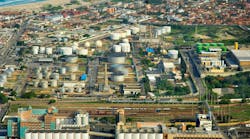The al-Qaeda terrorist group, which has long eyed ways of interfering with the oil and gas industry, continues to threaten world peace. But it is hardly the only show in town, as one expert has recently testified.
John Robb, the author of a respected new book on terrorism, last week warned in Oklahoma City that extremists of the future will attack oil refineries, natural gas pipelines, and other targets that provide vital systems to society.
“You can make these attacks far removed from where we’re at, and because of all the systems being interconnected it will have an impact on us,” Robb said in an interview with the Oklahoman newspaper.
The man has earned his stripes, too. A graduate of the US Air Force Academy, Robb served in a tier-one counterterrorist unit that worked closely with Delta and Seal Team 6. Robb participated in global operations as a mission commander, pilot, and mission planner.
Global guerrillas
Three or 4 years ago, Robb started a blog called “Global Guerrillas” in an effort to catalog and describe the evolution of system disruption and open-source warfare within the Iraqi insurgency and around the world.
Speaking at the Oklahoma City University School of Law last week, Robb said Americans could be paying as much as $10/gal for gasoline if a 2006 attack on a major Saudi Arabia refinery had succeeded.
This strategy of “systems disruption” has been seen in Iraq, Nigeria, Brazil, Mexico, and elsewhere, he said, adding that small terrorist groups are learning from each other, using technology, and evolving their tactics.
“Something works, everyone else adopts it,” he said. And, not least important, he noted that, “Very seldom do you see any of the attackers being caught.” Sound familiar?
If not, consider the Ejercito Popular Revolucionario (EPR), a secretive Marxist group that killed dozens of police and soldiers in the late 1990s. It’s back at work in Mexico, and its work is causing havoc to the country’s oil and gas industry.
The EPR strikes
On Sept. 10, the EPR hit the Mexican economy hard when it set off six explosions in Veracruz which damaged a dozen gas pipelines and one oil duct, temporarily halting industrial activity in 10 states and causing hundreds of millions of dollars in losses.
Pemex itself was suddenly in the market for 300,000 bbl of oil products to supply the domestic market amid refinery snags. The Mexican firm had to reduce production at its 320,000 b/d Tula refinery by 50% after the pipeline explosions reduced crude supplies to the plant. Its 245,000 b/d Salamanca refinery was also affected, reducing crude runs by 32,000 b/d.
Very clearly, this was systematic destruction by the EPR based on key intelligence, and it underlines Robb’s view that, “A small attack-something that cost a couple of thousand bucks to do-can have many million percent in return.”

